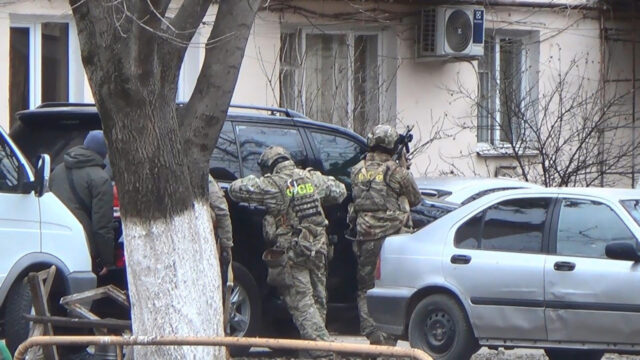Intelligence Report: The Ingush Jamaat and the Islamic State Wilayat Kavkaz

Kavkaz Files ISSN 2975-0474 Volume 22 Issue 1
Author: Giuliano Bifolchi
Executive Summary
The resurgence of Islamist radical activity in the North Caucasus region, particularly attributed to the Ingush Jamaat of the Islamic State Wilayat Kavkaz, poses a significant threat to regional stability and security.
Recent developments, including the dissemination of propaganda materials and counter-terrorism operations, underscore the persistent challenge posed by extremist elements.
This report provides an in-depth analysis of the current situation and offers recommendations to address the developing threat.
Background Information
On April 17th, 2024, the Telegram channel “Kavkazskiy Khrebet” reported the publication of an audio recording by militants from Ingushetia presented themselves as “the mujahideen of the Ingush Jamaat of the Wilayat Kavkaz,” appealing to religious radicals in the Caucasus to support the Islamic State. The channel author suggested that this propaganda aimed to revive the Caucasian branch of the Islamic State, which Russian security forces had diminished over the years.
Considering the high alert in the Russian Federation after the violent attack against the Crocus City Hall in Moscow, which resulted in over 130 victims, and the arrest of the four perpetrators and their supporters, the security situation in the country has worsened. Indeed, Russia, and particularly the North Caucasus, has proven to have become a ground where jihadist propaganda and terrorist organisations might exploit the Muslim population and the migrants to organise violent attacks against civilians.
For instance, on April 11th, 2024, a counter-terrorism operation in Nalchik in the Republic of Kabardino-Balkaria led to the neutralisation of two individuals involved in terrorist activities. According to the Russian National Anti-Terrorism Committee (NAC), these individuals, members of a group associated with an international terrorist organisation, were planning sabotage and terrorist acts in Kabardino-Balkaria.
On March 31st, 2024, in the cities of Makhachkala and Kaspiysk in the Republic of Dagestan, NAC conducted a counterterrorism operation, resulting in the apprehension of three militants who were planning a series of terrorist activities. During the search of the suspects’ locations, security forces discovered automatic weapons, ammunition, and a ready-to-use improvised explosive device.
Two days before, on March 29th, 2024, FSB arrested three citizens from Central for planning a terrorist attack by detonating an improvised explosive device in a crowded area within the territory of Stavropol Krai.
On March 2nd, 2024, FSB special forces conducted a counter-terrorism operation in Karabulak, Ingushetia, targeting a group of six individuals suspected of connections with the Islamic State. Upon attempting to arrest them, the suspects opened fire on law enforcement officers, leading to a shootout and a subsequent fire in the building. All six suspects were neutralised by the FSB special forces the following day, with no casualties reported among officers or civilians. Russian official sources identified the suspects as adherents of the Islamic State, linking them to multiple terrorist crimes, including an attack on a traffic police post and the murder of three police officers in March 2023.
Listen also | Ep. 7 – Terrorism and Security in the North Caucasus |
Islamic State, Terrorism, and Security in the North Caucasus
The North Caucasus region has been a hotbed of instability and conflict for years, with a tangled web of historical, ethnic, and religious factors at play. Following the collapse of the Soviet Union, the region witnessed a resurgence of nationalist movements and separatist aspirations, exacerbated by socio-economic disparities and political marginalisation. This environment provided fertile ground for the emergence of extremist ideologies, with Islamist radicalism acquiring traction among disaffected populations.
The First and Second Chechen Wars (1994-1996 and 1999-2009, respectively) saw intense fighting between Russian forces and Chechen separatist groups, leading to widespread destruction and loss of life. Despite the formal end of hostilities, sporadic violence and insurgency persisted.
The rise of global jihadist movements, particularly al-Qaeda and later the Islamic State, further exacerbated tensions in the region. Extremist groups, such as the Caucasus Emirate and then the Islamic State Wilayat Kavkaz, sought to establish an Islamic caliphate in the North Caucasus, advocating for the overthrow of secular governments and imposing Sharia law.
In response, Russian security forces launched a series of counter-terrorism operations aimed at dismantling terrorist networks and restoring order in the region. While these efforts have weakened extremist groups, the underlying drivers of radicalisation remain largely unaddressed, perpetuating a cycle of violence and instability.
Risk Assessment
The resurgence of Islamist radical activity in the North Caucasus region presents multifaceted risks to security and stability. Firstly, the emergence of propaganda materials attributed to the Ingush Jamaat of the Islamic State Wilayat Kavkaz (although there are no many evidence and sources which can confirm this information) shows a concerted effort by extremist groups to regain influence and recruit new members. This poses a direct threat to public safety, as individuals radicalised by such propaganda may engage in acts of terrorism targeting both security forces and civilians.
Secondly, recent counter-terrorism operations, while successful in neutralising immediate threats, highlight the enduring resilience of extremist networks. The discovery of explosives, automatic weapons, and improvised explosive devices underscores the sophistication and capability of these groups to conduct large-scale attacks.
Furthermore, the allure of jihadist propaganda and the persistent socio-economic grievances in the region exacerbate the risk of radicalisation among vulnerable populations. Failure to address these underlying factors could perpetuate a cycle of violence and instability, undermining efforts to achieve lasting peace and prosperity in the North Caucasus.
Read also | Terrorist Attack in Russia and Islamic State Wilayat Khurasan’s Jihadist Propaganda |
For further information, reports, and analyses on the security situation and the terrorist threats in the North Caucasus, contact us at info@specialeurasia.com.
